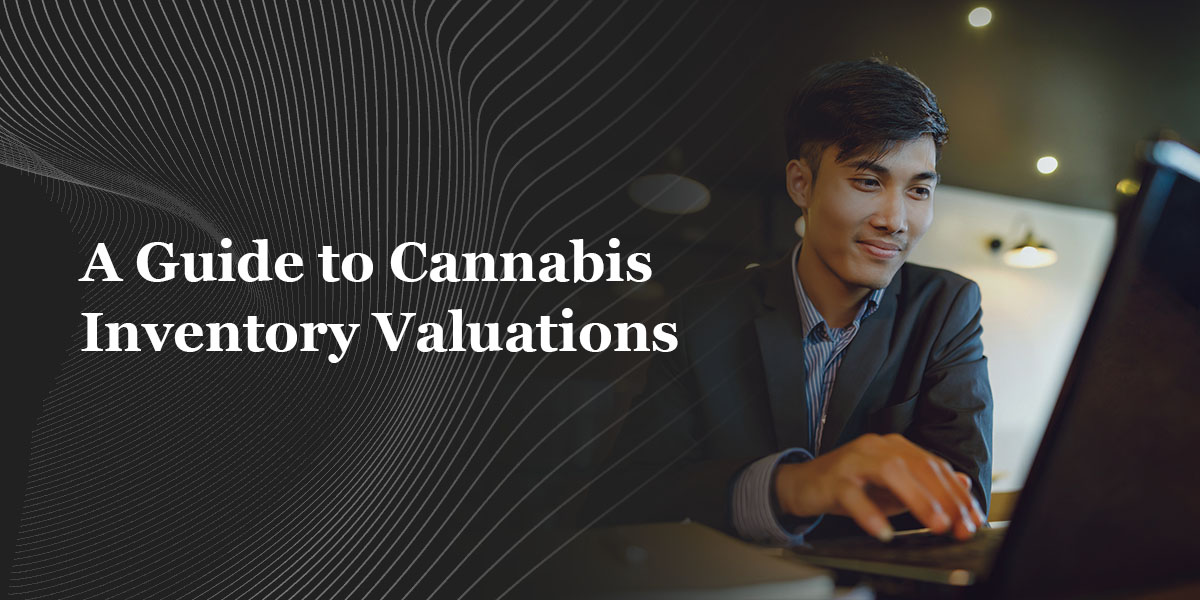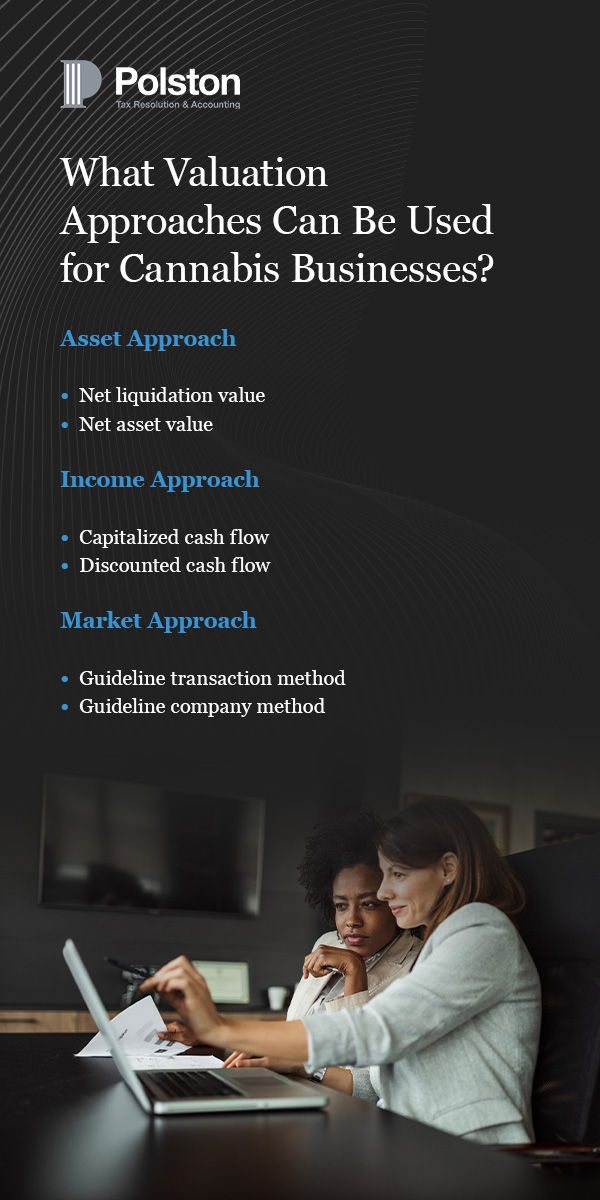
Finding the value of your cannabis company’s inventory can be a long and strenuous process if you don’t know where to start. Thankfully, you can take steps to ensure you calculate your value correctly and can present your findings to future investors or tax regulators. Cannabis company valuation begins with assessing your overall stock and creating a basis for the worth of your company. First, take some time to learn what inventory valuations are and how they may help your cannabis dispensary.
An inventory valuation is an internal auditing and analysis process that can help you determine what your business is worth. By looking at last year’s financials and inventory accounts, you can establish a baseline of your company’s strengths and weaknesses and determine what areas may allow you to grow.
Many valuations consider the value of your business’s cash flow and tangible assets, such as lease improvements, furniture, fixtures, inventory and equipment. Understanding the company’s operations and overall costs can help you in future acquisitions or financial projections. You’ll often find that an inventory valuation considers the total value of every product you currently have in stock. At the same time, a professional may assist you in understanding your operations while navigating state and government regulations.
Due to different consumer demands across various states, valuations are essential to determining insurance needs, coordinating buy-sell arrangements, financing collateral or reassuring your shareholders of your business’s staying power.
The stock is often classified into primary, secondary and tertiary categories during inventory valuations. Here are the kinds of products within each category:
Assigning a monetary value to your company is essential when keeping track of your cannabis business and managing the stock. Your inventory value often represents your current assets and allows you to make better financial decisions based on your available funds. In short, you won’t overspend because you know how much money you have to work with.
The more inventory you sell, the more cash you have to spend on procuring new items in your store and maintaining popular stock. Other reasons why calculating your inventory value is beneficial to your business include calculating your gross margin, following costing rules, capitalizing on inventory, managing inventory, following government regulations and tracking inventory turnover.

Calculating your gross margin is one of the first steps in determining the worth of your company. To calculate your gross margin, find the total of your sold inventory and add that to any extra direct costs you’ve acquired. This is equal to the price of your goods that have been sold. Subtract the goods’ cost from your total revenue to get your gross margin.
Owners often use the gross margin to determine what portion of their business’s revenue is available to spend. They can then focus on strategies to increase revenue while maximizing profit.
Costing rules often require that cannabis store owners capitalize on certain costs. This may include any expenses necessary for producing and manufacturing cannabis products.
As a taxpayer, cannabis business owners are often required to capitalize their inventory, direct costs, indirect costs and mixed service costs. Because of tax regulations, it is usually to the owner’s benefit to capitalize as much of their costs as possible. This may help you navigate your company’s taxes at the end of the year.
Inventory valuation may also help you manage your inventory in the future. If you want to keep your money organized and safe, a calculated valuation can help protect you from fines or losing your license. Once you know how much your business is worth, you may also understand more about your government’s cannabis regulations, preventing legal issues or possible arrests due to the mishandling of cannabis products.
A proper valuation can also help you follow regulations properly and navigate rules and local laws. State laws differ regarding cannabis distribution, and closely monitoring your inventory can help the government spot when certain products are illegally distributed on illicit markets. When you know where your stock is at all times and how much of it you’ve bought and sold, it is less likely that some items may end up in the hands of minors.
Inventory valuation may also assist in inventory turnover. Also called the stock turn, turnover refers to the amount you’ve sold out of your inventory. Understanding your sell-out patterns can help you establish an efficient management system and annually calculate your turnover for future financial projections.
If you want to calculate your turnover, try dividing your cost of goods sold by the average price of your inventory. If you have a high turnover score, this is a good sign, as it means that extra stock isn’t sitting around or going to waste.

Your cannabis business valuation may require different approaches depending on your specific inventory. Typically, owners use three approaches for the valuation process — the asset, the income and the market.
The asset approach will often review the net asset value of your business. To use the asset approach, subtract the value of your company’s liabilities from your current assets based on the fair market. Businesses often use this method when the value of assets is based on the drivers and not the business’s earnings or cash flow.
The two methodologies used during the asset approach are:
The income approach values your business based on future earnings projections, including your net cash flow, discount rates and terminal values. The two methodologies commonly used in this approach are:
The market approach compares and contrasts similar cannabis competitors’ sales and structures to find your own business’s valuation. The two most common market approaches include:
While the cannabis industry is an ever-growing and productive landscape, some challenges still exist when it comes to evaluating your business’s inventory. Understanding these challenges may help you overcome them and increase your revenue.
Cannabis is still illegal at the federal level, and many investors or operators consider this risk when looking at the cannabis industry. While the federal government allows states to self-regulate marijuana distribution, the Drug Enforcement Agency (DEA) still considers cannabis a Schedule I drug under the Controlled Substances Act (CSA) of 1970, which is the most restrictive class of drugs.
Because marijuana is classified as a Schedule I drug, the government can intervene in cannabis distribution whenever they want, making it difficult to project future financial gains and challenging to raise money for a marijuana start-up. Federal and state regulations mean many businesses struggle to keep up with the rules and laws associated with cannabis distribution and expansion.
Because cannabis is illegal on a federal level and legal in various ways depending on the state, navigating taxes surrounding a cannabis business can be stressful and confusing. Many tax regulations say your company’s costs should be considered non-deductable items on your tax return, except for those associated with the production, processing and storage of cannabis.
The lack of deductible items makes it harder for cannabis businesses to remain profitable while complicating the process of filing taxes. Some tax professionals may be able to help you with your cannabis taxes, but make sure you find someone knowledgeable about the industry as well.

The state of the cannabis industry is often volatile due to the constant changes in state laws and regulations. Whether you grow or sell products, you must often invest in new technology or licenses that require a lot of time and energy to maintain. To remain a top supplier as more states accept marijuana usage, cannabis store owners must adapt to the ever-changing industry.
Market data is often used to determine the value of your business. Unfortunately, because the cannabis industry is so volatile, it often presents incomplete market data because many companies are relatively new. This also limits the number of companies evaluators can use to compare their earnings, creating inaccurate financial projections among start-ups.
Because the cannabis industry is so new, many valuations rely on cash flow projections to decide how much their company is worth. Due to the limited operation time, many businesses do not know how they will determine their future taxes, and their projections may be inaccurate.
A cannabis valuation business can help you determine the value of your business based on cash flow and tangible assets like leasehold, furniture, fixtures, equipment and overall inventory and stock. Once these valuations have been calculated, your company can use them to work on financing collateral, finding the right insurance, working on buy-sell agreements or for your internal reassurance.
A valuation business will analyze last year’s finances and revenue growth while evaluating future projections, local customers demands and business operations. They should also be familiar with state and federal regulations to help them adhere to rules and codes.
Many cannabis companies may think that their business is worth more than it is. A cannabis valuation business can help you evaluate this claim while working confidentially within your business. Often the business may compare your company with others in similar industries and products while allowing you to use the valuation to understand the inner workings of your business model and find an accurate estimate of your worth that you can show to others.
A cannabis valuation business may also:
Cannabis industry accounting is easier once you’ve begun the valuation process. To start, the specialist or professional will need to access your company’s documents. This may include anything from financial statements and tax returns to a record of assets or legal documents and licenses. As an owner, you should prepare these documents ahead of time to have them ready for valuation. Ensure they are up to date with no errors or missing pieces.
Some specialists may also request to interview management, employees or stakeholders to get their facts on the company. Keep in mind that professionals must maintain an objective stance throughout the process. Once they’ve gathered enough information, the specialist will analyze this data through various approaches.
Depending on your business model, they may choose the income, asset or market approach described earlier. Expect the process to last a few weeks as the specialist conducts interviews and gathers information. The final report will show you the worth of your company in monetary value and insights on how you can further grow your business and move forward with new strategies.
At Polston Tax, we understand that navigating the cannabis industry can be complex and challenging. Many state and federal regulations also require you to comply with specific IRS tax codes under Section 280E. Our company has many experienced cannabis accountants to help you find the best service or program that fits your needs. We help you thrive in a highly regulated industry with tax services that save money and comply with cannabis laws. Contact Polston Tax today to speak to a representative or call us at 844-841-9857.